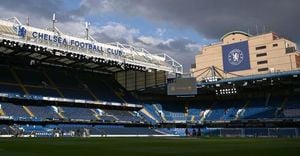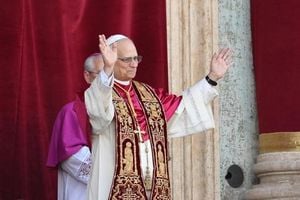VATICAN CITY — In a historic moment for the Catholic Church, U.S. Cardinal Robert Prevost has been elected as the new pope, marking the first time an American has assumed this role. The 69-year-old cardinal has chosen the name Pope Leo XIV, stepping into the shoes of his predecessor, Pope Francis, who passed away on April 21, 2025.
The announcement came at 19:13 on May 8, 2025, when Cardinal Dominique Mamberti, a 73-year-old Frenchman, declared to the world, "I announce to you a great joy: we have a Pope." This proclamation was met with cheers from the thousands gathered in St. Peter's Square, eagerly awaiting the identity of their new leader.
As white smoke billowed from the chimney atop the Sistine Chapel, it signaled that the 133 cardinal electors had reached a decision. The new pontiff was elected by a two-thirds majority, meaning he received at least 89 votes from his fellow cardinals. The excitement in Rome was palpable, as crowds gathered near the Via della Conciliazione to witness this momentous occasion.
In his first public address, Pope Leo XIV expressed his hopes for the future of the Church, stating, "May peace be with all of you." He reflected on the legacy of Pope Francis, saying, "The pope that blessed Rome gave his blessing to the whole world on that Easter morning. So let us follow up that blessing." The new pope emphasized the need for the Church to be a "missionary church" that builds bridges and fosters dialogue, welcoming all who seek charity and love.
Speaking in Spanish, he also acknowledged his roots, saying, "I would particularly like to say hello to my compatriots from Peru. It was a great pleasure for me to work in Peru." His remarks resonated with the global Catholic community, which includes approximately 1.4 billion members worldwide.
The conclave that led to Prevost's election began on May 7, 2025, after the cardinals were sequestered in the Sistine Chapel. They surrendered their mobile devices and entered a space that had been thoroughly checked for surveillance devices. The secrecy of the conclave is a tradition that underscores the gravity of the decision at hand.
Once the voting concluded and a new pope was determined, the ballots were burned with an additive to produce white smoke, a stark contrast to the black smoke that indicates no decision has been made. The rituals surrounding the election of a new pope are steeped in tradition, including the moment when the senior cardinal asks the newly elected pope if he accepts his canonical election.
After accepting, the new pope is asked what name he wishes to be called. Following this, the cardinals pay homage and pledge obedience to their new leader. The new pontiff is then dressed in papal attire in a room known as the Room of Tears, which has become a symbol of the emotional weight associated with the papacy.
The Room of Tears is prepared with garments in various sizes, reflecting the uncertainty of who the next pope will be. This tradition is rooted in the experiences of previous popes who have reportedly been moved to tears upon their election.
As Pope Leo XIV prepares to lead the Church, he acknowledges the challenges ahead, particularly in a world marked by division and strife. "Let us pray together for this new mission, for the whole church. And for peace throughout the world. And let's ask for this special grace from Mary, our mother," he urged the faithful.
The election of Pope Leo XIV comes at a time when the Catholic Church is navigating significant changes and challenges, both internally and externally. The legacy of Pope Francis, who was known for his progressive stance on various issues, sets a high bar for his successor. The new pope's approach and vision will be closely watched as he embarks on this pivotal journey.
In the days leading up to the conclave, discussions among cardinals reflected a desire for continuity and renewal within the Church. Many believed that the next pope should carry forward the initiatives started by Pope Francis while also addressing the pressing issues facing the global Catholic community.
Pope Leo XIV's election is a moment of pride for many in the United States, where the Catholic population is significant. His background and experiences as a missionary in Peru may influence his papacy, fostering a connection with a diverse range of Catholics around the globe.
As the world watches, the new pope's leadership style and decisions will shape the future of the Catholic Church, guiding its 1.4 billion followers through the complexities of modern society. The excitement surrounding this election is a reminder of the enduring significance of the papacy in the lives of millions.
With his first public appearance, Pope Leo XIV has set a tone of openness and dialogue, inviting the faithful to join him in a mission of peace and charity. The journey ahead is sure to be filled with challenges, but the new pontiff remains hopeful, calling for unity and compassion among all people.
The announcement of Pope Leo XIV is not just a new chapter for the Catholic Church but also a significant moment in history, as the first American pope steps into a role that has profound implications for the Church and its followers worldwide.





